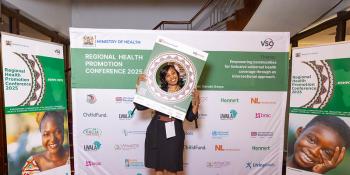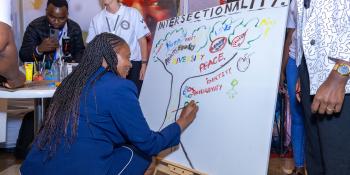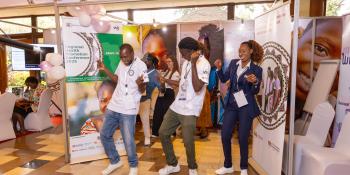Rwanda is truly a nation of volunteers. A commitment to working with your community towards a common purpose is engrained in its national spirit, and the role that volunteering has played post the 1994 genocide is a lesson we can all learn from.
I was recently in Rwanda to see firsthand our work and programmes there, as well as take part in the year-long celebration of 20 years of VSO’s operations in the country. The genocide is unlikely to remain far from the mind of the travelers to the country –and many, like I did, take the time to visit memorials and learn directly from the experiences of survivors.
Troubled past
For those that may not be aware, an estimated 1,000,000 mainly Tutsi Rwandans were killed during the 100-day period from 7 April to mid-July 1994. The country was decimated following the mass slaughter, and the painful process of recovery, reconciliation and justice begun.
At the Genocide Memorial Museum in Gikondo, Kigali I learnt a lot about the planning and the architects of the genocide. It is also the resting place for more quarter of a million of the genocide’s victims. Incredibly moved by the experience, my colleagues and I laid a wreath of flowers in honour of those who perished.
As we toured the memorial, we listened through the troubled past of the resilient Rwandan people, taking on a greater appreciation not just of what they had suffered, but just as crucially the ability of the country’s people to withstand such a cataclysm and bounce back.
Resilience and recovery
In the hills of the Nyamasheke District, which lies about an hour east from the border with Democratic Republic of Congo, I learnt more about part of this process of resilience and recovery. ‘Umuganda’ is basically a form of communal volunteering, where Rwandans aged between 18 and 65 years, including visitors like myself, come together with a common purpose.
‘Umuganda’ is basically a form of communal volunteering, where Rwandans aged between 18 and 65 years, including visitors like myself, come together with a common purpose.
In this instance, Umuganda’s main objective is cleaning and tidying the villages. This also explains why Rwanda is internationally renowned as one of the cleanest countries in the world. The volunteering nature of ‘Umuganda’ fascinated me. Volunteering for development is in our DNA at VSO, and it was easy for me and my colleagues to relate to the concept.
VSO's 20 years of working in Rwanda
20 years ago the Rwanda Government invited VSO to start operating in the country. Many Rwandans with skills, including teachers and professors, had either been killed or displaced during the genocide. The aftermath of this carnage left huge gaps in education and health and depleted people’s livelihoods. The genocide cast a long shadow over the country and its development.
Our first volunteers in those early days were nearly all international professionals, mainly from the UK, who worked on education and farming projects. Much has changed though over the last two decades. Today we have a mix of international and national volunteers (Rwandan graduates) working across many remote areas of rural Rwanda. In classrooms, teacher training colleges and directly within remote communities, our volunteers are building and helping to meet the demand for a higher-calibre learning.
Commitment to renewal
Like VSO, Rwanda has also changed beyond what could have really been imagined or expected over the last two and a half decades. According to the UK Department for International Development (DFID), one of VSO Rwanda’s main funders, the country has largely reduced its dependency on global aid to 16 percent of its budget, from around 60 percent post the 1994 Genocide.
Almost 2 million people have been lifted out of poverty since 2005 and the economy has grown at an average of 8 percent per year since 2000. Rwanda’s Human Development Index (an official indicator of life expectancy, education and income) compares highly favorably compared to most other countries on the Africa continent
Everywhere you go in the country, you see and sense this commitment to renewal, especially so among young Rwandans. At the Mwezi Teacher Training College (in Rusizi), that VSO Rwanda supports with funding from Dubai Cares, a young trainee excitedly explained to me, “I want to be a teacher and I think I will teach until my dying breath.” I asked her why and she replied, “I want to educate other Rwandans.”
That spirit is infectious, and has been the catalyst to our work in the country. Over just the last five years, VSO has improved the quality of teaching for over 2,500 teachers, and as a consequence, over 250,000 children have had improved learning outcomes. Over 5,000 farmers have seen their incomes grow thanks to our support, and over 2,000 young adults have benefitted from reproductive health information thanks to our programmes.
Rwanda has a profound lesson to teach the world about the latent capacity for inhumanity which lies below the surface of every society. But the people of this very special country also left me with an overwhelming sense of people’s ability for recovery and resilience.
There isn’t a corner of the globe that wouldn’t do well to learn and copy the ‘Umuganda’ volunteering initiative. Beyond the role that it’s played in the country’s recovery, the dynamic spaces created for citizens and communities to connect and learn from each other could also have a profound impact on all of us.
Read more

In photos: Our Regional Health Promotion Conference 2025
Check out some of our favourite photos from Regional Health Promotion Conference (RHPC25). This event sought to reimagine Universal Health Coverage through the lens of intersectionality.

Using intersectionality to create healthy beginnings and hopeful futures
World Health Day brings global attention to the urgent need to end preventable maternal and newborn deaths. Learn more about how our Regional Health Promotion Conference is tackling these issues head on.

Highlights from the Regional Health Promotion Conference 2025
The Regional Health Promotion Conference 2025 reimagined Universal Health Coverage (UHC) through the lens of intersectionality, by bringing together experts from across East Africa and beyond.
